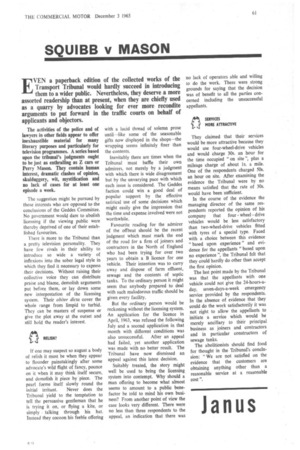SQUIBB v MASON
Page 63

If you've noticed an error in this article please click here to report it so we can fix it.
EVEN a paperback edition of the collected works of the Transport Tribunal would hardly succeed in introducing them to a wider public. Nevertheless, they deserve a more assorted readership than at present, when they are chiefly used as a quarry by advocates looking for ever more recondite arguments to put forward in the traffic courts on behalf of applicants and objectors.
The activities of the police and of lawyers in other fields appear to offer inexhaustible material for many literary purposes and particularly for television programmes. A series based upon the tribunal's judgments ought to be just as enthralling as Z cars or Perry Mason. They contain human interest, dramatic clashes of opinion, skulduggery, wit, mystification and no lack of cases for at least one episode a week.
The suggestion might be pursued by those interests who are opposed to the conclusions of the Geddes Committee. No government would dare to abolish licensing if the viewing public were thereby deprived of one of their established favourites.
There is more to the Tribunal than a pretty television personality. They have few rivals in their ability to introduce so wide a variety of inflexions into the sober legal style in which they find it necessary to express their decisions. Without raising their collective voice they can distribute praise and blame, demolish arguments put before them, or lay down some new interpretation of the licensing system. Their obiter dicta cover the whole range from limpid to turbid. They can be masters of suspense or give the plot away at the outset and still hold the reader's interest.
nRELISH?
If one may suspect so august a body of relish it must be when they appear to flounder painstakingly after some advocate's wild flight of fancy, pounce on it when it may think itself secure, and demolish it piece by piece. The pearl forms itself slowly round the initial irritant. Never does the Tribunal yield to the temptation to tell the persuasive gentleman that he is trying it on, or flying a kite, or simply talking through his hat. Instead they cocoon his feeble offering with a lucid thread of solemn prose until—like some of the seasonable gifts now displayed in the shops—the wrapping seems infinitely finer than the contents.
Inevitably there are times when the Tribunal must baffle their own admirers, not merely by a judgment with which there is wide disagreement but by the unvarying pace with which each issue is considered. The Geddes faction could win a good deal of popular support by the effective satirical use of some decisions which might easily give the impression that the time and expense involved were not worthwhile.
Favourite reading for the admirer of the offbeat should be the recent judgment which must mark the end of the road for a firm of joiners and contractors in the North of England who had been trying for over two years to obtain a B licence for one vehicle. Their intention was to carry away and dispose of farm effluent, sewage and the contents of septic tanks. To the ordinary person it might seem that anybody prepared to deal with such malodorous traffic should be given every facility.
But the ordinary person would be reckoning without the licensing system. An application for the licence in April, 1963, was refused the following July and a second application in that month with different conditions was also unsuccessful. After an appeal had failed, yet another application was made with no better result. The Tribunal have now dismissed an appeal against this latest decision.
Suitably treated, the story might well be used to bring the licensing system into contempt. Why should a man offering to become what almost seems to amount to a public benefactor be told to mind his own business? From another point of view the case looks very different. There were no less than three respondents to the appeal, an indication that there was no lack of operators able and willing to do the work. There were strong grounds for saying that the decision was of benefit to all the parties concerned including the unsuccessful appellants.
fail SERVICES
MORE ATTRACTIVE They claimed that their services would be more attractive because they would use four-wheel-drive vehicles and would charge 30s. an hour for the time occupied "on site ", plus a mileage charge of about is. a mile. One of the respondents charged 50s. an hour on site. After examining the evidence the Tribunal were by no means satisfied that the rate of 30s. would have been 'sufficient.
In the course of the evidence the managing director of the same respondents reported the opinion of his company that four wheel drive vehicles would be less satisfactory than two-wheel-drive vehicles fitted with tyres of a special type. Faced with a choice between this evidence "based upon experience" and evidence for the appellants "based upon no experience ", the Tribunal felt that they could hardly do other than accept the first opinion.
The last point made by the Tribunal was that the appellants with one vehicle could not give the 24-hours-aday, seven-days-a-week emergency service provided by the respondents. In the absence of evidence that they could do the work satisfactorily it was not right to allow the appellants to initiate a service which would be merely ancillary to their principal business as joiners and contractors and in particular constructors of sewage tanks.
The abolitionists should find food for thought in the Tribunal's conclusion: "We are not satisfied on the evidence that the customers are obtaining anything other than a reasonable service at a reasonable cost ".
















































































































































































